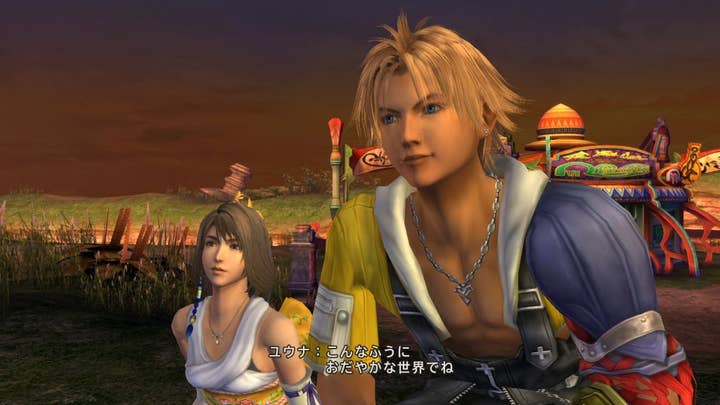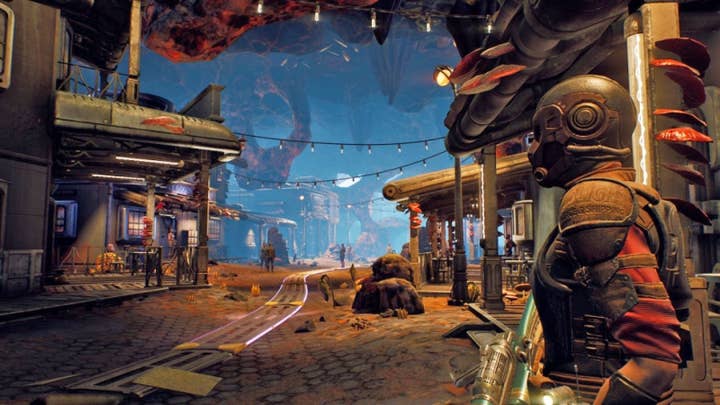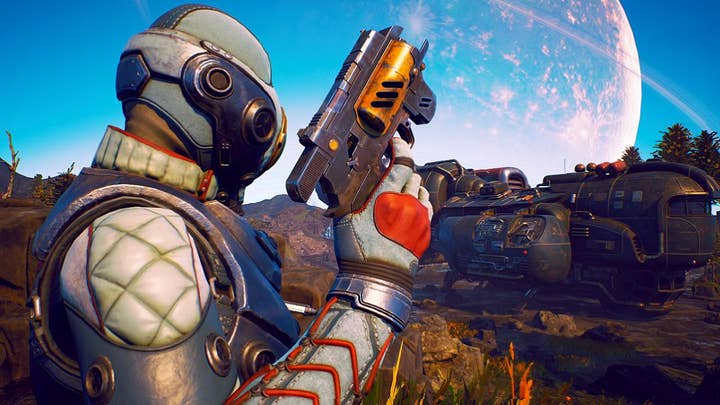Virtuos: Switch ports, co-development, and next-gen
Virtuos on its journey from small contract studio to pushing the boundaries of what's possible on Nintendo Switch
Virtuos was founded in 2004, with the goal of shipping games on every major platform on the market, whether that was PlayStation 2, Nintendo DS and PSP, or Xbox 360, Wii and PlayStation 3. The company's early work involved smaller scale projects, like the fantastic Speed Racer game for Nintendo DS, porting Sony's MotorStorm: Arctic Edge from the PSP to Playstation 2, and working on ports of the NBA 2K series for PlayStation 2, Wii, and PSP.
Today, though, Virtuos is better known for its porting and remastering of big-budget AAA titles for modern platforms, while maintaining feature parity and even introducing improvements that weren't in the original games. It was behind the Switch, Xbox One and PlayStation 4 ports of LA Noire and Final Fantasy XII: The Zodiac Age, as well as the Nintendo Switch versions of Dark Souls Remastered and Obsidian Entertainment's upcoming RPG, The Outer Worlds. It lent its expertise to Ubisoft's Star Link: Battle for Atlas on Switch, and you can even find its name in PlatinumGames' Astral Chain, to which Virtuos contributed 3D art from its studio in Chengdu, China.
"Things [for Virtuos] changed with the remaster of Final Fantasy X/X-2 for the PS3," CEO Gilles Langourieux tells GamesIndustry.biz. "We realized that there was a lot of value in bringing AAA titles to new platforms if done well. Meanwhile, our partners also began to understand that our ability to line up a larger number of artists and engineers than traditional developers allowed us to be more thorough in our adaptations.
"The talent we've brought into the company has been excellent at developing for the PS4, Xbox One and Switch"
Gilles Langourieux
"With Virtuos, you could afford to add features that the fans were asking for, and take extra care in refreshing the art so that it felt true to the original while doing justice to the new platform. This resulted in an acceleration in demand for our adaptation services, as well as our co-development capacity for AAA titles."
Virtuos currently employs 1,600 people across 11 offices around the world, with its largest studio in Shanghai. Langourieux says the company was largely funded by its own operations in the early years, save for two "minor" rounds of funding in 2006 and 2013 respectively. In 2018, though, Virtuos closed its first major investment round, alongside a structured debt arrangement that allows the company to make studio acquisitions if the right partners are found.
Virtuos, he says, has been profitable every single year since its exception, save for one. It has methodically funnelled those profits into growing its teams, which is how it's managed to scale up so quickly.
"The transition was natural, since we've always laboured to ensure that the company has a broad range of talent in our game development division and that they are given access to high quality training programs to elevate their skillsets," he says. "The talent that we've brought into the company has incidentally been excellent at developing for the PS4, Xbox One and Switch, which is a valued asset that our partners recognised and eventually made use of."

Today, Virtuos runs three kinds of project models in parallel: a project model, where the studio works on games on a case-by-case basis; a retainer model, where a developer or publisher hires Virtuos to work on a long-term project; and a co-production model, where Virtuos invests its own money alongside a partner. Among these is what the company is best known for among consumers these days: its impressive portfolio of Nintendo Switch ports, bringing AAA games to the hybrid device.
"We feel that we're pushing the limits of what is possible on the Switch with The Outer Worlds"
Virtuos' vice president of games Elijah Freeman recently caused a bit of a controversy when he revealed to Nintendo Life that the company is being contracted to "create bespoke Switch titles for some of the most beloved IPs in [the] industry." The reaction to his use of the word "bespoke" on message boards and other forums of discussion was largely negative. Some consumers evidently fear a repeat of the dreaded Wii and Wii U days, where Nintendo platforms would typically receive low-budget spin-offs of popular brands, such as Dead Space: Extraction or SoulCalibur Legends.
These "lesser" games -- for which there was never any explicit demand to begin with -- would be released to predictably poor sales. This, in turn, would propagate a myth that third-party games don't sell on Nintendo platforms.
Today, the situation is about as different as you could imagine. Nintendo Switch ports are usually feature-complete and up-to-par with the versions on PlayStation 4 and Xbox One, allowing people with busy lives a more flexible way to spend time with these games. Each time a port of a popular game is announced for the Switch, it's met with a wave of enthusiasm and excitement on social media.
Publishers like 2K and Bethesda are on record stating that a number of Switch ports have met or exceeded sales expectations, and that more of their games are on the way. Meanwhile, titles like Fortnite and Divinity: Original Sin 2 have even implemented cross-play and cross-save functionality with other platforms, making the Switch an even more flexible device.
I ask Freeman if he could clarify to GamesIndustry.biz what he meant when he used the word "bespoke" in his earlier comments. Were the dreaded days of undesirable spin-offs making a return?
"Players and developers expect full, high-quality versions of their games on the Switch platform," he replies. "There are many ways to add gaming value and create a bespoke version of the game on the Switch. There are three different modes: TV mode, tabletop mode, and handheld mode. All three modes can potentially offer a new and unique experience for the player.
"Look towards the Switch as a way to rejuvenate a brand. The audience is younger than those who typically own other consoles"
Elijah Freeman
"From a Virtuos perspective, we view 'bespoke' versions as tailored versions of the client's IP to the Switch platform. Generally, this consists of adapting a control scheme or implementing new playability by adding some of the unique features, such as touchscreen [controls]. These features can provide a new layer of engagement, and capitalizing on these gameplay additions can make the difference between a good game and a great game."
Freeman adds: "We often have this conversation with partners who developed their original game for PC or HD consoles and think that it won't run on the Switch. Give enough time to a specialized team, and they will find enough technical and content optimizations to make it play seamlessly. It's simply a matter of priority: How do you balance the distribution of tasks for the GPU and CPU to achieve the expected results? This can be especially challenging if it were a classic game with an antiquated code base, but it's totally feasible."
With regard to Virtous' work on Obsidian's The Outer Worlds specifically, Freeman says that the goal is to make the game look "as close as possible" to the other platforms.

"This requires creative thinking when it comes to frame-rate and memory optimization, especially for the larger maps with complex environments. We have a strong team of technical artists who are rearranging and streamlining workflow, and we've set up a VIP -- a Very Important Place -- in the room, which is basically a table with TV sets where we constantly cross-compare the Switch version with other SKUs. We are excited about our progress, because we feel that we're pushing the limits of what is possible on the Switch."
Given that Virtuos has a number of Switch projects under its belt and is intimately familiar with the platform and its audience, I ask Freeman what sorts of genres he personally feels would work well (and sell well) on the device, and what publishers should be looking at.
"Sports titles and shooters in general," he replies. "I'm personally excited to see quality shooters like Overwatch entering the list of Switch titles. Aside from that, I would also like to see design features that capitalize on the stop-and-go rhythm of players that travel, such as better facilitation of wireless, proximity-based multiplayer."
"Game developers are pushing for ultra-high framerates and 4K graphic fidelity to be the new norm"
Elijah Freeman
Freeman also feels that not targeting the Switch with as many games as possible would be a mistake for developers right now. Investing in the platform, he says, is tantamount to investing in the future of your IP.
"Given the flexibility of the Switch as a gaming platform, I think most genres wouldn't feel out of place on the Switch," Freeman points out. "In fact, not taking advantage of the biggest portable gaming platform in the market today could even be seen as a lost opportunity. The first thing we recommend is not treating the Switch as a secondary platform and to plan for a simultaneous, day one release of the Switch version of your game. The second recommendation is to add special features and extra content; simple efforts that only incur a marginal workload impact, but can prove to double the interest from both Nintendo and the Switch player-base, consequentially doubling the revenue potential."
He adds: "Look towards the Switch as a way to rejuvenate a brand. The audience is younger than those who typically own other consoles, so having your IP on the Switch is a great way to invest in the future."
Meanwhile, Virtuos is also involved with games that target the next generation of consoles. Next year is expected to bring full reveals of the next Xbox and PlayStation platforms with accompanying software, and Virtuos is already being tapped to lend its expertise to these games.
"The power boost provided by the new consoles, along with the current state of cloud gaming, means developers are planning on making huge improvements to their franchises," Freeman says. "With the additional computation power and streaming capabilities, game developers are pushing for ultra-high framerates and 4K graphic fidelity to be the new norm.
"[The] transition to the next-gen consoles means we're seeing two kinds of projects coming our way. The first category consists of projects that were envisioned for current-gen systems, for which we are brought on to assist in building the next-gen versions. The second category includes projects that were designed for the next-gen systems from the get-go, for which we are co-developing or co-creating part of the content alongside our partners.
"For example; the sequel to a current-gen game is likely to display more elements on screen on the next-gen version. Scalable solutions are required to produce this additional content at high quality. It's an area where Virtuos has a lot to offer."
